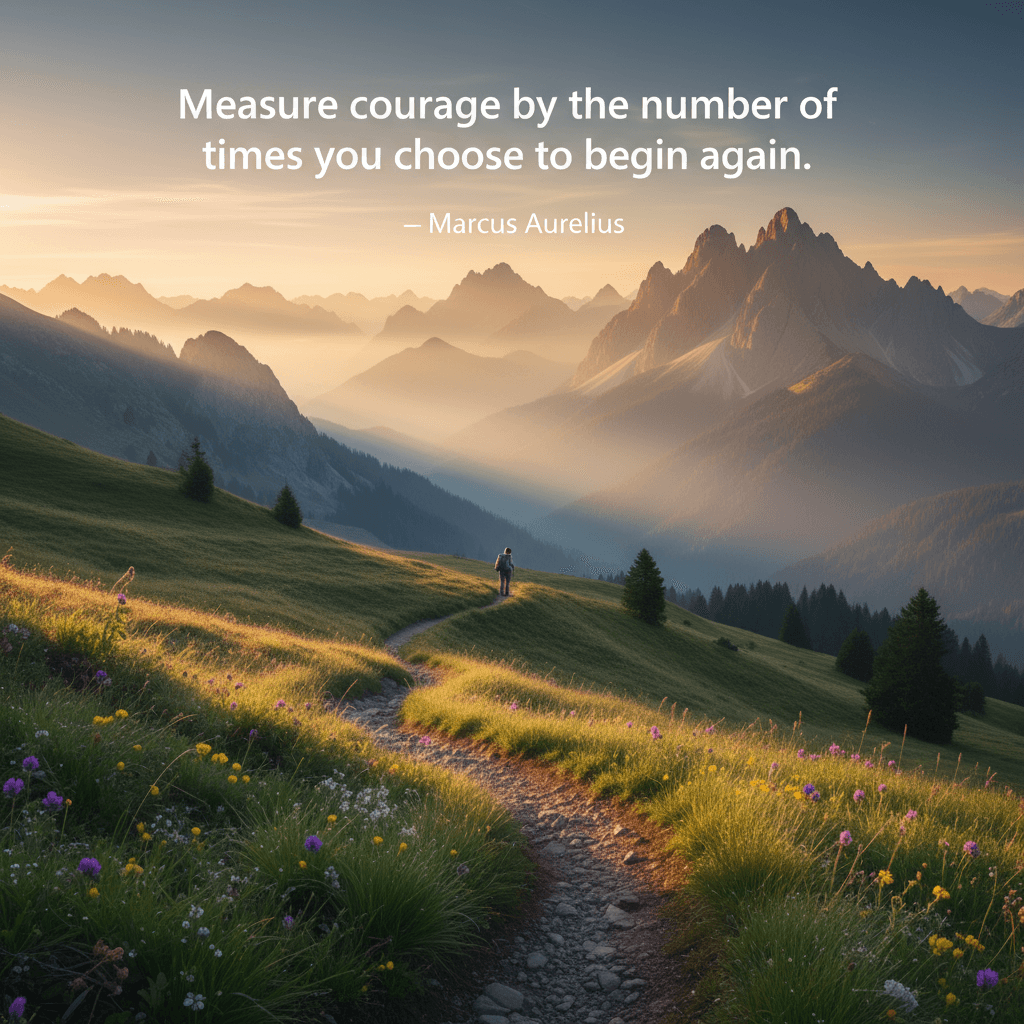Courage Measured by Choosing to Begin Again

Measure courage by the number of times you choose to begin again. — Marcus Aurelius
Rethinking Courage as Persistent Renewal
At first glance, courage conjures images of decisive victories and dramatic stands, yet this maxim shifts the metric from outcomes to renewals. Courage, it suggests, is not a single, blazing act but the steady willingness to restart the work after fatigue, failure, or fear. By tying bravery to repeated beginnings, the quote honors the quiet resilience that often goes unnoticed. And because beginnings demand humility—an admission that we’re not finished—it reframes courage as a disciplined openness to try again. With that reframing in place, we can see why Stoic practice made daily recommitment a central virtue rather than a consolation prize.
Stoic Roots and the Morning Resolve
From this vantage, the line harmonizes with Marcus Aurelius’s habit of morning resolve. In Meditations 2.1, he prepares himself at dawn to meet difficult people and to keep his purpose anyway; in 5.1, he chides his reluctance to rise and return to the human task. While the exact wording above is not found verbatim in surviving texts, its spirit aligns with his repeated call to resume one’s duty without complaint (Meditations 2.1; 5.1). The point is continuity: each day is another beginning. Thus, the maxim reads less like a slogan and more like a summary of Stoic rehearsal—return to the path, however many times life pushes you off it.
Choice, Agency, and the Inner Citadel
Moving deeper, the verb choose anchors the measure of courage in agency. Stoic ethics pivots on what Epictetus calls prohairesis—the faculty of choice that remains ours even when circumstances do not (Epictetus, Discourses 1.1). Marcus repeatedly urges returning to one’s governing reason rather than indulging irritation or despair, which makes beginning again an interior decision before it is an external act. In this light, failures do not define us; our next deliberate step does. Consequently, the metric honors what lies within our control: the decision to resume our standards, our work, and our goodwill, even when the world is no easier than yesterday.
Iteration as Ethical Training
From agency we move to training, because beginnings are repetitions that form character. Stoic askēsis—practical exercises like reflection, rehearsal, and review—converts intention into habit, one restart at a time. As Pierre Hadot explains in The Inner Citadel (1998), Marcus’s notes function as spiritual exercises that return him to first principles amid disruption. Each restart is thus not a reset to zero but a spiral upward: repetition with refinement. Such iteration mirrors craft and athletics, where drills harden skill; in ethics, the drill is recommitment to justice, temperance, courage, and wisdom. So measured, courage is the stamina to iterate one’s values in the face of entropy.
Wise Restarts: Learning, Not Looping
Even so, brave beginnings are not blind repetitions. They carry learning forward, turning stumbles into improved strategies. Modern research on growth mindset (Dweck, 2006) shows that framing setbacks as information sustains effort; likewise, Gary Klein’s premortem (2007) treats imagined failure as a guide to smarter restarts. The Stoic version is simple: examine what went wrong, extract the lesson, and adjust the plan without self-accusation. In practice, that means refining scope, timing, or support—beginning again, but not in the same way. This discriminating return differentiates courageous perseverance from stubborn looping, allowing renewal to be both resilient and intelligent.
Daily Practices for Beginning Again
Finally, courage becomes measurable when encoded in small, repeatable acts. Implementation intentions—“If situation X, then I do Y”—help convert resolve into action (Gollwitzer, 1999). Micro-resets such as the two-minute rule, a quick walk, or a one-line journal entry lower the threshold for restarting. Seneca’s nightly review (“On Anger” 3.36) models gentle accountability: What did I do well? Where did I err? What will I change tomorrow? These rituals keep the gate of beginning again always open. Over time, the tally of such returns—quiet mornings, mid-day resets, evening recommitments—becomes the truest register of courage lived rather than merely admired.